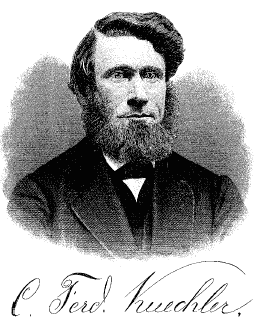Karl Ferdinand Kuchler 1822 - 1897
April 09, 2009
 Karl Ferdinand Kuchler 1822 -
1897
was a German orthodox physician who converted to
homeopathy
and immigrated to America.
Karl Ferdinand Kuchler 1822 -
1897
was a German orthodox physician who converted to
homeopathy
and immigrated to America.
Kucher was the homeopathic practitioner of Bettina von Arnim.
Kuchler M. D., of Springfield, Ills., was born in Lanchstædt, near Halle, Germany, June 17th, 1822.
Dr. Kuchler received his first instruction in the teaching of the immortal Hahnemann in the city of Berlin, Prussia, where, while a student, in 1844, he became acquainted with Professor J. Pantillon, first homeopathic physician of that city, who, in consequence of a remarkable cure effected in the case of a daughter of the celebrated Bettina von Arnim, was, by special decree of the king, permitted to practice and dispense his own medicine ; a privilege never before granted to any physician.
In November, 1845, Dr. Kuchler left Berlin for Bremerhaven, and the same month embarked for America in the ill fated ship “Pacific.” When three days out, the ship was wrecked and Dr. Kuchler, having lost everything but the dressing-gown and slippers which he wore, returned to Bremerhaven, and there commenced the practice of medicine. It was there he first met Constantine Hering, who, with his bride, was returning to America.
In July, 1846, Dr. Kuchler again sailed for America, and arrived safely in New York, after a stormy voyage of forty six days. Nine months afterward he removed to Springfield, and was at that time the only homeopathic physician between Chicago and St. Louis; and but one person in Springfield knew anything of homeopathy.
Yet in one month’s time, in consequence of his great success, his practice became so large that he was compelled to seep an associate, and he invited Dr. Bernhard Cyriax, now at Cleveland, to become his partner.
In 1848, Dr. Kuchler married Miss Meta Fischer, of Bremen. In 1866, worn by the cares incident to an extensive practice, and burdened with grief for the loss of a favorite daughter, the doctor sought relief in change of labor and of scene, and for a few weeks returned to the fatherland.
During this visit, while at Cœthen, he was introduced by Arthur Ernst Lutze to Fraulein Hahnemann, the only surviving daughter of the great reformer; and at the old family residence he sat in the famous arbor where her illustrious father wrote and studied, and drank a glass of the Gose, of which he had been so fond. He was presented also with a lock of the great master’s silvery hair, which he values as one of his choicest treasures.
In person, Dr. Kuchler is slight, but well built, with large grey eyes and a profusion of glossy black hair; though not a man of large physique, his vitality is great, and he possesses a wonderful amount of mental power; retaining that enthusiasm which led him, when a poor man in Bremerhaven, to spend his last dollar for the privilege of passing a few hours with Caspar Julius Jenichen, of Wismar, the famous advocate of high potencies.
In his successful practice, he values more the continuous triumphs of homeopathy than his golden fees. But we are inclined to believe that his remarkable successes are not more due to the high potencies, to the use of which he so persistently adheres, than to his clear head and largely sympathetic nature; for through his acute sympathy, mental and physical, we believe him to be, (although perhaps unconsciously) greatly aided in his diagnoses, and, through the confiding trust his manner inspires, is he greatly assisted by his patients in forming those accurate judgments, upon which success in the use of all potencies depends.
A consistent member of the Baptist Church, beloved by the poor, admired by his colleagues, trusted and respected by all, few men have crowded more of quiet usefulness in the same years, or made themselves more necessary to the community, in which they dwell, than Dr. Kuchler.
Of interest:
Samuel Hahnemann’s first wife was Johanna Leopoldine Henriette Kuchler 1764 - 1830. They had 11 children.